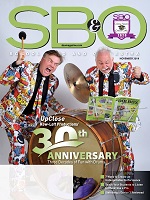Does judging your own band strike you as a silly notion, or could it actually serve a purpose? Try these techniques for some significant benefits for you and your band.
How It Works
Though nobody expects to attend a band festival and judge his or her own band, if you’ve been struggling to get better performance results and higher scores, self-adjudicating before the event can help achieve your goal. When you listen to concert recordings or rehearsal work tapes, place yourself in the role of an objective listener evaluating someone else’s band.
Initially, listen all the way through for musical effect, then start over for a detailed, stop-and-go analysis of the performance. Use a legal note pad or computer to make comments about each music detail indicated in the score and the degree to which your group does or doesn’t execute it.
For example, if the clarinets are to play staccato, listen closely to determine if they do. Or, if the finale features a fp-crescendo, does it come through clearly on the recording? Do the espressivo passages really reach out and grab you, or are they so-so?
As you listen objectively, try to respond as a judge might. Is the group executing dynamics effectively, or would you advise them to make much wider contrasts? Do they need to improve technical fluency and ensemble precision? In other words, if you hear anything that needs attention, there’s a good chance a festival judge will hear it the same way.
Self-adjudicating your band before festival appearances gives you the chance to fix problems before the real evaluators hear them.
Student Involvement
Let your students do some listening and self-assessment of their own. In addition to helping them concentrate on important facets of the music, particularly those needing attention, you’ll be training them to listen critically and evaluate music performance.
You can involve band members in another way by printing out a list of “problems to fix,” detailing which measures have flaws, what those problems are, and which members of the band need to remedy them. If you duplicate and distribute this information for student use so they can make notations on their music, you’ll be surprised at their response and how thoroughly they attack the job of “getting it right.”
By including them in the process, you’ll see more investment on their part and, consequently, better results when your band performs.
Benefits
Okay, you get the opportunity to correct a few more problems, but what are the other outcomes of self-adjudication?
Not the least of the positives you can expect to gain from this process is the improvement of your ability to achieve detachment and impartiality, possibly the cleansing of your aural palette for more accurate listening, and the opportunity to hone your critical listening acuity.
Even the most discriminating director/educator will occasionally listen in horror to a concert recording and wonder how he or she could have missed so many mistakes and weak areas. During the process of rehearsing toward target performances, we instinctively give greatest attention to the most obvious problems, probably hoping lesser mistakes will improve over time.
The trick is to not be seduced by the belief that the little problems have steadily gotten better – though they may have, marginally – without questioning whether they will ultimately meet our personal performance standards. The longer we let “not so bad but not so good either” intonation or technical passages exist, the more our ears may tend to accept them as norms until we stop finding them objectionable. And the longer we direct our attention to only solving the big problems, the more likely we’ll tend to lose the discriminatory skill to listen for fine nuances and lead our students to perfect them on the path to higher levels of play.
One of the most dramatic effects of self adjudication – and possibly the most lasting for students – has been the development of a deeper, more authentic understanding of music. Instead of functioning like loyal automatons, faithfully reproducing what they’ve been programmed to play, young band members can learn to get past the notes and capture the musical importance of what they’re playing.
For me, one gratifying acknowledgment of such understanding has come from adjudicator/clinicians when they begin their work with the band by saying, “This middle school band plays so well that I don’t have to spend time on ‘nuts and bolts’ and we can talk about the finer points of music and its expression.”
Critical self-evaluation helps young musicians achieve a higher level of understanding and keeps directors’ listening clear, objective and accurate.
Language of Fine Playing
As we and our students direct our attention to the salient elements of fine band performance stressed in adjudicated events, we should find our focus sharpened to better recognize critical musical elements and help us become more conversant with all facets of exceptional playing.
When judges, clinicians, or colleagues discuss blend and balance, ensemble precision, intonation, or musical expression, we need for those terms and concepts to have already been ingrained in our vocabularies as directors, as well as those of our students, if the comments are to have meaning and impact.
Self adjudication can be a big help in learning to speak the language of discriminating high achievement in band performance. Judging your own band involves several organizational strategies but provides clear benefits. Devise a way of making it happen. Involve the students. Create benefits for yourself and your band. Cultivate the language of fine playing.
Consider self-evaluation as a tool, readily available to help you and your band produce band performances of exceptional quality.
To help prepare for an upcoming festival performance, distribute this type of worksheet to your students, filling in the information that is appropriate to your ensemble.
Problems That Need to Be Fixed Before Festival
| Measure | Section(s) | Problem |
|---|---|---|
|
1
|
All
|
Make sure the fp is clear
|
|
5
|
Flutes, clarinets
|
Tune the unisons
|
|
5
|
Percussion
|
Too loud |
|
9
|
Suspended cymbal Crescendo
|
didn’t come through
|
|
22
|
Brass, percussion
|
Watch the director on the ritard
|
Note: This technique is most effective when each student receives a copy, along with the instruction that these comments should be transferred to each player’s parts.



























